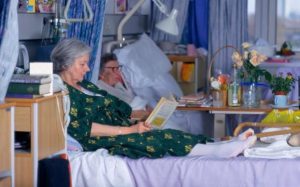Latest News
The Rhapsody Project
The project forms a European collaboration across six countries (England, France, Germany, the Netherlands, Portugal and Sweden) where researchers have developed an online programme to provide information and help to carers. It will be available online 24 hours a day using a desktop or tablet computer.
We caught up with Dr Bridget Jones, a researcher for the UK arm of the Rhapsody Study to find out more.
What are the main aims of the project?
We have developed an online programme to provide information and help with skills carers may find useful. We would like to find out whether this particular form of support, which is available online 24 hours a day using a desktop or tablet computer, is beneficial for carers.
The objective is to find out whether the online program is easy to use and helpful, and whether it can reduce the carers’ stress and burden, and increase their quality of life. Participation from Join Dementia Research volunteers will provide information that will help us to improve the program before it is used more widely. This study has been reviewed and favourably approved by the University of Surrey Ethics Committee.
Participants’ opinions are important. We are particularly interested in the opinions of those who support someone living with young onset dementia. We appreciate the insight that informal (unpaid) carers provide on the type of information that helps. We value your voice.
What does it involve for a participant?
All participants in the study will be given access to the online program. However, the time when each person will gain access to the program will be determined by a random procedure (like flipping a coin). One half of the participants will have access to the program immediately after enrolling in the study. The other half will be given access to program after a period of 2 months.
The program itself provides important information about young onset dementia and demonstrates ways of coping that may be helpful for carers. It also includes practical information about where to get help, as well as links to relevant websites and resources. There are video clips, interactive sessions and reflective questions, as well as an online discussion forum where participants can share comments.
Who can take part?
We are looking for 25 volunteers to test the online program and provide feedback on how helpful and easy it is to use, before it is made more widely available.
Carers who volunteer should:
– be 18 years old or older
– be the main carers for a person diagnosed with Alzheimer’s disease or frontotemporal dementia in the last 3 years, and who experienced first symptoms before the age of 65
– have access to a computer or a tablet device with an internet connection and have a basic level of internet and computer literacy.
Carers of patients with dementia caused by HIV, traumatic brain injury, Down’s syndrome, Huntington’s chorea, vascular or alcohol-related dementia are not included in this study.
How long is the study for?
All participants in the study will be given access to the online programme for 6 weeks and will be asked to provide feedback to the research team.
You can see if you are eligible for this study, as well as others around the nation, by logging into your Join Dementia Research account.
Not registered with Join Dementia Research? Why not sign up today?

Adult social care forum: Individuals and carers
MPs on the Communities and Local Government Committee want to hear about your experiences of accessing adult social care support and services and providing care.
- What works and what doesn’t work about the current system?
- Have you seen services in your area change?
- How could services be improved?
- As a carer, what do you think are the challenges facing the sector?
- As a carer, are you getting the support you need, financially and in terms of your health and well-being?

Share your views on new standards to keep your patient data secure – Healthwatch
Over the summer the Government is seeking views from the public on plans for how the NHS will be able to use patient data to improve services and treatments.
In particular they are looking at how the NHS should be working in order to protect your data and how you can choose what your data is used for.
We are working with local Healthwatch to promote the consultation to make sure people have the chance to share their views.
As part of this, we have created a survey to help gather people’s views to inform our formal response to the consultation.  If you would like to share your views on the proposed consent and data security standards, please fill in our survey.
The ‘Review of Data Security, Consent and Opt-out‘, produced by the National Data Guardian Dame Fiona Caldicott, sets out recommendations for how patient’s health and care information should be used within the NHS. The report was commissioned by the Department of Health and received evidence from Healthwatch England and local Healthwatch about the public’s views on consent and data security.
Recommendations include:
Ten new data security standards to apply to all organisations which hold health or care information.
Leaders of health and social care organisations should demonstrate clear accountability and responsibility for data security, just as they do for clinical and financial management and accountability.
A more extensive dialogue with the public
There should be more conversations with the public about how their information is used. They should be made aware of the benefits of information sharing such as researchers making breakthroughs in life-saving medicines to regulators spotting quickly when things go wrong.
A new opt-out for those who do not want their information shared
The review recommends a new opt-out for people who do not want their confidential information to be used for purposes other than their direct care. Dame Fiona has reaffirmed that whether people opt out or not, they should be reassured that their health and care information will only ever be used if the law allows and never for marketing or insurance purposes, unless they separately consent to this.

5 Commons Errors in Taking Care of Elderly Parents
1.  Ignoring Signs and Symptoms of Mental Health Problems
Depression can be difficult to identify. Common symptoms include a loss of motivation, atypical anger, insomnia, anxiety, inability to make decisions, changes in weight, fatigue, loss of interest in activities, unexplainable physical ailments, and talk of suicide.
Depression is not a normal part of aging. While all seniors will experience some of the inevitable losses associated with aging—deaths of close friends, loss of mobility, loss of energy—long-term depression is not an inevitable part of the aging process. If the seniors in your life are exhibiting behaviors unusual for them, express your concern and encourage them to talk to their doctor or a licensed mental health professional.
2.  Not Asking for a Full Cognitive Evaluation
If one of your parents is experiencing memory loss, it’s important to see a geriatrician or a geriatric neuropsychologist for a full cognitive evaluation. While it’s not uncommon for a general practitioner to identify a senior’s forgetfulness as dementia, it is important to take it one step further and diagnose the cause of the dementia. Dementia might be caused by Alzheimer’s disease, Lewy body dementia, or vascular dementia. It might also be a result of alcoholism, reactions to medications, or, if there is a sudden onset of confusion, a urinary tract infection. Dementia is a symptom (such as a cough) and not a specific disease. Receiving a full diagnosis will assist you in making an appropriate treatment and care plan. Just as a doctor would prescribe a treatment for a respiratory infection that is different than one for pneumonia, the treatment plan for dementia varies depending on the cause.
3.  Not Allowing Them to Feel in Control
It’s important for everyone, not just seniors, to feel in control of their own lives. It’s easy for children who are taking care of their elderly parents to want to step in and take control to make sure that their parents’ needs are met. One of the needs elderly parents have, however, is to maintain autonomy and sense that they are in control of their own lives.
Instead of making decisions for them, have a discussion with your elderly parents in which you share your concerns. Brainstorm solutions and be willing to compromise. If needed, involve the input of a neutral third party—such as a doctor or geriatric care manager—to help form unbiased conclusions relating to their care.
4.  Not Allowing Them to Fail
Just as your parents couldn’t protect you from all the decisions you made in your youth, you can’t protect your parents from all the decisions they will make in their golden years. Of course, you don’t want to leave your parents at risk if they are facing safety or serious medical concerns; however, your parents will be much more open to your input if you give them space to make decisions and the permission to fail. Sometimes, an adult child may need to reduce his or her level of involvement in order for the parent to see for themselves that help is necessary. For example, Dad may really be in need of assisted living, but it may take a ten-pound weight loss for him to come to terms with it.   Mom may need some help with homemaking, but it may take a thick covering of dust for her to see that.
5.  Assuming Assisted Living or the Nursing Home is the Only Option
Assisted living facilities and nursing homes are great options for many seniors. There are those who simply cannot take care of their own medical needs or are not safe living without supervision. Assisted living facilities and nursing homes, however, are not the best options for every senior. Today, there are many other choices available, which include residential living, independent senior housing, and remaining at home with assistance.
In order to remain at home, there are a variety of services available that offer assistance. Programs such as Store-to-Door and services such as Meals on Wheels provide options for getting groceries and full meals delivered to their door. A home care nurse would be able to set-up medications.  Non-medical home care companies can make visits for meal preparation, medication reminders, and light housekeeping. Personal care attendants or home health aides can assist with bathing or toileting.  Not only do these options allow people to live in their own homes, but often a mixture of these options can also be less expensive than making a full move into assisted living or a nursing home.

Night Tube: Underground bosses in fresh row amid claims 24-hour service ‘excludes’ wheelchair users
Leading charity Muscular Dystrophy UK have published the damning report about the new night time service launching on the Central and Victoria lines on Friday.
It reveals that just 13 per cent of Night Tube stations have step-free access and common Underground routes take over four times as long for disabled people who need to change to find accessible stations.
The charity has argued this will “exclude†wheelchair users from parts of the city and stop them from enjoying the benefits of the extended service.
The Chief executive Muscular Dystrophy UK, Robert Meadowcroft, called on Transport for London to take note of the report’s finding, which he described as “simply unacceptableâ€.
He said: “While the introduction of a 24-hour tube service could provide disabled people with improved social and employment options, the reality is a network still largely inaccessible and awkward for those with disabilities.
“It’s simply unacceptable. TfL have clearly recognised the need to modernise their service, but this vision should be extended to ensure accessibility is boosted across the network.
“As the night-tube is rolled out, disability charities like ours must be involved in consultation to ensure the needs of disabled people are fully met.
“We call on TfL to raise the number of step-free stations way beyond its current paltry level, and create an underground system open and accessible to all.
“Only then can disabled people fully enjoy the benefits of a night tube, along with the rest of London.â€
A TfL spokeswoman said: “London has one of the most accessible transport networks in the world, but we know it can still be difficult for some Londoners to get around.
“That’s why we’re investing hundreds of millions of pounds in making stations and trains more accessible.
“We will offer every assistance possible to Night Tube customers – with turn up and go services, fully-staffed stations with staff trained by disabled people and a wide range of information available to our customers including step-free guides, tips on getting around, and regular updates on our accessibility Twitter feed.
“More than half of our Underground and Rail stations will be step-free by 2018 and the Elizabeth line, which includes 40 step-free stations, will open through central London at the same time – transforming access for disabled Londoners.”

Post-code lottery in care revealed as government publishes dementia ‘atlas’ of standards across England
Jeremy Hunt, the Health Secretary, will name and shame the areas of England which are failing in dementia care in a new online “Dementia Atlasâ€Â of Britain.
The atlas reveals huge gaps in the quality of care, with around 80 per cent of those with the illness being made to attend hospital in Knowsley, Merseyside, compared to 16 per cent in Medway, Kent.
Stark differences in end of life care are revealed with four in five people with dementia passing away at home in Devon but parts of London seeing the majority die in hospital wards.
The map also shows which areas have the most “dementia friends†– people in the local community specially trained to help – and factors that increase risk of developing the illness such as smoking.
Mr Hunt believes that the map will help “drive up standards†across the country to ensure patients get the standard of care that they need. It is part of his drive for more transparency in the NHS.
Mr Hunt will launch the tool is being unveiled today alongside Carey Mulligan, the British actress and star of The Great Gatsby and An Education, who is becoming the first ever UK Global Dementia Friends Ambassador.
She today reveals that she experienced at first-hand the “devastating†impact of dementia because her grandmother suffers from the disease.
The new atlas has five different categories for how good an area is for dementia patients, including prevention, diagnosis and support as well as “living well†and “dying wellâ€.
The data shows that some of England’s most rural areas score well on Government indicators while many inner city areas are worse off.
Cornwall and Devon, Cumbria and coastal areas of East Anglia score highly when it comes to allowing patients to be treated in care homes rather than in hospitals, something Mr Hunt and other ministers have long demanded to relieve pressure on the NHS.
These areas also give dementia sufferers regular check-ups, which professionals say is essential to ensure that patients have a good quality of life in spite of their illness.
The data also shows that parts of the country are failing to allow patients to die at home. Mr Hunt has previously hit out at dementia suffers being left to die in “horrific conditions†rather than surrounded by family of friends at home.
Parts of London have the worst record for allowing dementia patients to pass away at home, with more than 6 in 10 dying on hospital wards in the boroughs of Tower Hamlets, Hounslow and Newham.
The best area for regular checks on dementia care is North East Lincolnshire, which does so for 86 per cent of patients, while Somerset has the lowest score at 49 per cent.
Nottingham West has the highest proportion of people aged over 65 with dementia at 5.6 per cent while the lowest in Kernow, Cornwall, with just 3 per cent.
Mr Hunt said: “People living with dementia deserve the best possible care- and this new Dementia Atlas is designed to drive improvements across the country.
“By publishing the current levels of care, we are shining a spotlight on areas where there is still work to be done, whilst highlighting where we can learn from best practice.â€
He added: “The impact of dementia tears at families and at our social fabric –  that’s why making progress is a key government priority.
Mr Hunt will appear alongside Mulligan to make the announcement at Heathrow airport today to train staff as it becomes the world’s first “dementia friendly†airport.
Ms Mulligan said: “My Nan has dementia and I have experienced first-hand how devastating it can be. It affects everyone differently, and it’s so important that everyone affected by the condition is treated with the respect and dignity that they deserve. At the moment, there’s not nearly enough awareness and as a global society we have a duty to change that.
“The first step involves educating people and breaking down stigma – not just on our doorstep, but across the world. I’ve seen my Mum doing this in her role as a Dementia Friends Champion – now I’m honoured to become the first Global Dementia Friends Ambassador and help Alzheimer’s Society and the Government change global attitudes towards dementia.â€
The move is part of the government’s drive to increase transparency of the NHS’s performance in an attempt to boost standards.
David Cameron, the former prime minister, oversaw the drive to open up the NHS’s data to the public.
Since 2013, over 1.6 million people have signed up to become a “dementia friendâ€, all of whom have committed to taking an action to help someone with dementia in their community.
The drive helps teach people about the realities of the illness and how to best cope with those who are affected  in day-to-day life.
The Alzheimer’s Society is working to reach 4 million dementia friends by 2020, while there are also around 150 “dementia friendly communities†in England alone where shops and companies have been trained.
Jeremy Hughes, Chief Executive at Alzheimer’s Society, said: “As the global dementia crisis snowballs, collaboration between countries is crucial in creating lasting change and a global dementia movement towards acceptance, inclusion and support for people living with dementia and their carers. We look forward to Carey’s leadership helping us tackle stigma on an international scale and achieve better lives for people with dementia the world over.â€

New Photography Grant Aims to Fund Work About Alzheimer’s
“They say it’s the long goodbye and it truly is,†says Gina Martin, a National Geographic Creative employee. The long goodbye she references is Alzheimer’s. In 2011, Martin’s mother, Diane, died after a five-year fight against the disease. “I saw up close what Alzheimer’s does to a person and their family,†she says. And that’s why she decided to launch the Bob and Diane Fund, an organization that will promote and help finance photographic work about Alzheimer’s and dementia.
The fund offers an annual $5,000 grant for stories that deal with loss or with the growing medical crisis caused by Alzheimer’s, says Martin. “I want people to know that Alzheimer’s is more than just memory loss. It’s so much deeper and devastating than that. It affects the family and the caregivers deeply. It’s a complete personality change of the person.†Martin’s mom was diagnosed with Alzheimer’s in 2006, upending her life and that of her family members. “My father, Bob, was her loyal caregiver for five years,†says Martin. “He died just three months [after Diane died].â€
The Bob and Diane grant is open for entries until Oct. 15. The winner will be announced in November.

NHS in grip of worst bed-blocking crisis on record, figures show
The data from NHS England shows a near doubling in the numbers of patients stuck in hospital, for want of care at home, or help to get them discharged.
The figures for June show little let up in pressures during summer, at a time when strain on the NHS traditionally eases.
Overall, 115,425 bed days were lost to delayed discharges in June – almost 80 per cent more than the same month five years ago.
Just 90.5 per cent of patients who went to Accident & Emergency departments were seen within four hours, against a target of 95 per cent – the worst June figures on record.
Those stuck in A&E included 84 patients who were forced to wait at least 12 hours on a trolley. Until now, the highest figure in June has been 25.
Ambulance response times were also a record low for the time of year, with just 69.2 per cent of the most urgent calls receiving a response within eight minutes, against a target of 75 per cent.
Charities said a funding crisis in social care meant thousands of vulnerable people were being left in hospital, when they should have been cared for in their homes.
Vicky McDermott, chairman of the Care and Support Alliance, which represents 80 charities for the elderly and disabled said: “The Government cannot continue to ignore the crisis that means that patients are stuck in hospital, when they could be at home.
“The funding crisis in social care is heaping needless pressure onto the NHS. A third of bed days lost to delayed discharge are due to social care and the biggest reason for social care delays is ‘patients awaiting a care package in their home.’â€
The figures emerged amid warnings from senior managers that A&E departments are struggling to cope.
Earlier this week NHS managers at University Lincolnshire Hospitals NHS trust said they were considering closing an Accident & Emergency (A&E) department at night after reaching “crisis point”.
Grantham and District Hospital is considering plans to restrict A&E hours at Grantham and District Hospital after becoming “seriously affected” by a “national shortage of appropriately trained doctors to work in A&Es”.
The latest figures prompted an attack on the Government’s handling of the NHS – and criticism of Jeremy Corbyn’s leadership for “letting the Tories get away with itâ€.
Labour leadership candidate Owen Smith, said the NHS was “in terminal declineâ€.
“With Jeremy Hunt in charge hospitals lurch from one crisis to another – and it is patients who are left to suffer. Waits for ambulances are going up, A&E departments are bursting at the seams and cuts to social care have left older people trapped on hospital wards for weeks or even months at a time,†he said.
“This is no way to run the NHS and with a weak opposition we are letting the Tories get away with it,†he added.
NHS England defended the performance, pointing out that June saw the highest number of A&E attendances on record, with a 2.1 per cent increase on last year.
Health officials said some aspects of the performance showed an improvement on previous months.
Matthew Swindells, NHS England’s National Director: Operations and Information, said:   “Our frontline services continue to come under intense pressure but June saw another improvement in performance. We continue to admit, treat or discharge more than nine out of ten emergency patients within the four-hour target time. Thanks to tremendous efforts by the NHS and social care, the number of delayed transfers of care stopped increasing in June, although there were still a significant number of patients waiting for discharge from hospital.â€
In recent days, senior figures have raised concerns about growing levels of rationing across the NHS.
Today health officials in Merseyside announced plans to withdraw one of the most controversial proposals – the suspension of all non-urgent surgery for months.
The plans from St Helens clinical commissioning group, revealed in the Telegraph, had provoked a public outcry.
Local authorities are being given access to £3.5 billion extra a year for adult social care, in a bid to tackle bedblocking, officials say.
A Department of Health spokesperson said: “The NHS had its busiest June ever, but hospitals are performing well with nine out of ten people seen in A&E within four hours – almost 60,000 people per day seen within the standard.
“We are committed to delivering a safer seven day NHS which is why we have invested £10bn to fund the NHS’s own plan to transform services in the future,” he said.

Want to get involved in Peckham Festival? Join the team celebrating creative Peckham!
Opening with an outdoor pedal powered cinema, open artist studios, live gigs and the big artist-led ‘Great Peckham Sketch-In’, we’ve a range of events happening and are looking for a range of enthusiastic local volunteers to join our festival team to make this year – our first but not our last – a huge success.
We need volunteers to undertake a variety of roles, including artist liaison, stewarding, set up, gardeners, helping the public and making the festival accessible to all. You’ll be based at the Bussey building/Copeland Park complex near Peckham Rye station. Be part of the team that makes it happen!
The festival is produced by the people who own the Bussey Building/Copeland Park complex with support from Southwark Council.
Depending on your skills, experience and interest tasks may include:
- Being a friendly face for the Peckham public to approach for information about what’s going on at each event
- Liaising with and supporting local artists and musicians during performances and helping events run smoothly
- Stewarding events, providing support to members of the public
- Helping set up the festival, including building our green ‘Reclaimed Rye’ area, looking after plants, hanging lights and making it a beautiful place to sit and enjoy all the fun.
Suits people who have any of the following attributes
- Enjoy meeting new, local people of all ages and backgrounds
- Are outgoing and like helping others
- Enjoy working outdoors
- Love music, art, film
- Love Peckham!
- Have technical skills in fitting lights and stage set up
- Are DIY-handy, fit and strong
- Have time to give and are available for dates
Why volunteer at Peckham Festival?
- Meet new, local people and be part of a dedicated and friendly team celebrating Peckham’s finest
- Build on and use your skills (customer service, artist liaison, setting up events)
- Make a real difference to our visitors
- Meet local artists, musicians and entrepreneurs
- See great performances and have lots of fun
As well as the roles listed above, we are looking for people who can take on additional responsibilities by becoming a team leader, who can lead and supervise a team of volunteers on shift. Support the volunteer coordinator with scheduling, organising lunch breaks and answering volunteer questions.
Please note all volunteers must be over 18 years old.
Contact us at [email protected]
Tel: 020 7635 0000
Peckham Festival
Studio DGJ
Bussey Building,
133 Rye Lane,
London SE15 4ST

Carers get thrown into a confusing world of forms and appointments
I finally discovered the help I needed after a policeman found me crying at the side of the road. I had been caring for my husband for some time but I didn’t really think of it in that way, I was just looking after my husband – this is just what you do for the people you love.
I had become overwhelmed trying to juggle everything and realising I needed help but with no idea where to go or what to ask for. You’ve suddenly entered a new world of forms, official looking letters and doctors’ appointments. In the beginning it can leave no time to take care of yourself or to try and work out what you’re supposed to do – you need help with that. It’s like a new job with no training.
‘A lot of it is about pride’
I remember at a really low point when things had got bad at home my husband reminded me that it’s “in sickness and in healthâ€. I can laugh about it now, but the truth is, when it’s a member of your family, you can become really isolated because you don’t like telling anybody that you’re not coping.
A lot of it is about pride – we’re supposed to just get on with it and not complain. This is what you do to take care of family. You do that thing of saying “yes I’m fineâ€, until one day you realise that you’re not fine because you’re at the side of the road crying.
So who is there to help? I still think this is a big problem which is why I was recently involved in helping to develop a guide called Spotlight on a Carer’s Journey. The introduction of the Care Act ensures carers are recognised as being important too, but do any of us really know what that means?
‘I was lucky’
I was lucky, the policeman directed me to an organisation called Carers’ Resource that specifically supports carers. I went in crying my eyes out and came back out laughing. I couldn’t believe that there was support for me on my doorstep and I didn’t know anything about it. Why hadn’t anybody told me?
To have somebody just listen to me, and not feel judged by whether I was coping or not, it was such a relief. In just one session we quickly sorted practical things that you just don’t realise are preying on your mind. It was the simple things that gave me the most comfort, like making a backup plan in case anything should happen to me or if I was sick – just knowing who I could contact, I can’t tell you what a pressure that is to release.
‘Someone listened’
Somebody listened to me and asked me about my needs, not my husband’s. And we got everything up and running so quickly – what to apply for, where and how to apply, all that admin stuff. Carers’ aren’t told this, or if they are it’s not in a way that they understand and that’s a big problem.
This kind of information should be in local shops and market places, it needs to be much easier for people to find out about. Most of us end up caring for somebody at some point, and when it happens very few of us are prepared.
At Carers’ Resource they understood how difficult it had been for me to have to give up my support work for social services and so it was such a relief when we worked out how I could work from home by offering respite care for adults with learning disabilities.
I also had a grant to join the local gym because I now know how important it is to make time for me. Not everybody lives near to an organisation like this, there’s so many people out there that don’t understand why it’s important for carers to look after their own health and wellbeing.
‘Too many are left to do this alone’
Some of my friends say “you’re a saintâ€. I’m no saint – as a carer we’re all just doing what we need to do on a daily basis. Like so many other people I meet in support groups, I’m just getting on with it. But we all need help, we all have “one of those daysâ€. Now I’ve got support, a place to go when I have “one of those days†and other carers know what that means. I also feel more educated about what I’m entitled to and where to go for help.
There are still many people like me, caring for people in their families and just trying to do it alone with no idea of the support you can get. We should be making it much easier for them because they’re important too.
Freda contributed to Spotlight on a Carer’s Journey, a guide from the National Development Team for inclusion that was co-produced with carers and carers organisations to provide support for organisations helping carers or commissioning services.
